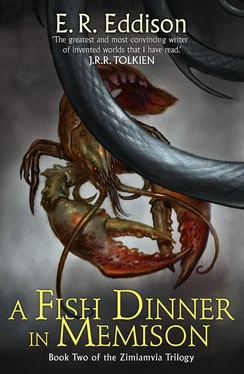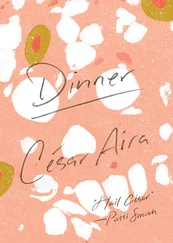Vintage. Vindemiatrix : she who harvests the grape: the delicate star in whose house the sun sits at autumn, and with her mild beams moderates his own to a more golden and more tranquil and more procreative radiance.
Nine months gone: Dahomey, Spain, Corsica. And April now: the twenty-second of April. A hundred and fifty-nine days to go.
The back arrowed swoop of the moment swung high into the unceilinged future, ten, fifty, sixty years, may be: then, past seeing, up to that warmthless unconsidered mock-time when nothing shall be left but the memorial that fits all (except, if there be, the most unhappiest) of human kind: I was not. I lived and loved. I am not. Then (or was it a bat, of the bats that hawked there between the piazza lamps and the stars?) it swung near, flashing darkly past that Dark Lady’s still mouth, at whose corner flickered a something: miraculously that which, asleep or awake, resided near the corner of Mary’s mouth.
Queen of Hearts: Queen of Spades: ‘Inglese Italianato’: the conflict of north and south in his blood; the blessing of that – of all – conflict. And yet, so easily degraded. As woman’s beauty, so easily degraded. The twoness in the heart of things: that rock that so many painters split on. Loathsome Renoir, with his sheep-like slack-mouthed simian-browed superfluities of female flesh: their stunted tapered fingers, puffy little hands, breasts and buttocks of a pneumatic doll, to frustrate all his magic of colour and glowing air. Toulouse-Lautrec, with his imagination fed from the stews, and his canvases all hot sweat and dead beer. Etty’s fine sensuality coarsely bitted and bridled by a convention from without, and starved so of the spirit that should have fed it to beauty from within. Burne-Jones’s beauties, nipped by some frost: Rossetti’s weighted with undigested matter: Beardsley, a whore-master, prostituting his lovely line to unlovely canker-buds. Even the great: even Titian in his Sacred and Profane Love , even Botticelli in his supreme Venus, were (he said in himself), by some meddling from within or without, restrained from the ultimate which I would have, and which as a painter I (Kapaneus’s  – with God’s will, or if not, against it) will attain. Did the Greeks, with their painted statues, Apelles with Phryne for his model, attempt it? Did they, attempting, succeed? We can never know. Do such things die, then? Things of the spirit? Sappho’s burnt poems? Botticelli’s pictures of ‘beautiful naked women’ of like quality, perhaps, with his Venus and his nymphs of spring? – poor consolation that he was burnt that burnt them.
– with God’s will, or if not, against it) will attain. Did the Greeks, with their painted statues, Apelles with Phryne for his model, attempt it? Did they, attempting, succeed? We can never know. Do such things die, then? Things of the spirit? Sappho’s burnt poems? Botticelli’s pictures of ‘beautiful naked women’ of like quality, perhaps, with his Venus and his nymphs of spring? – poor consolation that he was burnt that burnt them.
Yes. They die 

 – half brother to man-slaying Hector, and his charioteer; under the dusty battle-din before Ilios, ‘ mighty, mightily fallen: forgetful of his horsemanship’. All time past, the conflict and the heartbreak (he looked at the amphitheatre, a skeleton lifted up to witness): frozen. He looked at her: her eyes were more still than the waiting instant between the flash and the thunder. No. Not frozen; for that is death. No death here: rather the tenseness of sinew that is in the panther before the leap: Can Grande’s tomb, as this morning, in broad sunshine. Below, under the Gothic canopy carved in stone, the robed figure, lying in state, of the great condottiere, submissive, supine, with pious hands clasped upon his breast as in prayer, ‘ requiescat in pace ’, ‘ Domine, in manus tuas ’, etc., weak childhood come back like a song’s refrain, sightless eyes facing upwards. But above, high upon that canopy, the demonic equestrian figure of him in the April sap of his furious youth, helmed and harnessed, sword aloft, laughing on his caparisoned horse that seems itself to be informed with a secret kindred laughter, to say ha! ha! among the trumpets: a stirring together of the warring mights and glories, prides, overthrowings, and swiftnesses, of all worlds, to one flame; which takes on, of its mere eternity and only substantiality, as ice will scorch or fire freeze, the semblance of a death-like stillness.
– half brother to man-slaying Hector, and his charioteer; under the dusty battle-din before Ilios, ‘ mighty, mightily fallen: forgetful of his horsemanship’. All time past, the conflict and the heartbreak (he looked at the amphitheatre, a skeleton lifted up to witness): frozen. He looked at her: her eyes were more still than the waiting instant between the flash and the thunder. No. Not frozen; for that is death. No death here: rather the tenseness of sinew that is in the panther before the leap: Can Grande’s tomb, as this morning, in broad sunshine. Below, under the Gothic canopy carved in stone, the robed figure, lying in state, of the great condottiere, submissive, supine, with pious hands clasped upon his breast as in prayer, ‘ requiescat in pace ’, ‘ Domine, in manus tuas ’, etc., weak childhood come back like a song’s refrain, sightless eyes facing upwards. But above, high upon that canopy, the demonic equestrian figure of him in the April sap of his furious youth, helmed and harnessed, sword aloft, laughing on his caparisoned horse that seems itself to be informed with a secret kindred laughter, to say ha! ha! among the trumpets: a stirring together of the warring mights and glories, prides, overthrowings, and swiftnesses, of all worlds, to one flame; which takes on, of its mere eternity and only substantiality, as ice will scorch or fire freeze, the semblance of a death-like stillness.
All this in a few seconds of time: apocalyptically.
Lessingham answered her: ‘Signora, if I were God Omnipotent, I should be master of it. And, being master, I would not be carried by it like a tripper who takes a ticket for a cruise. I would land where I would; put in to what ports I liked, and out again when I would; speed it up where I would, or slow it down. I would wind it to my turn.’
‘That,’ she said, ‘would be a very complicated arrangement. One cannot deny it would be a pleasure. But the French precision, I fear, would scarcely apply itself so fitly, were that the state of things.’
‘You would hardly have me do otherwise?’
Slowly drawing off her right-hand glove, she smiled her secular smile. ‘I think, sir (in my present mood), that I would desire you, even so, to play the game according to its strict rules.’
‘O,’ said Lessingham. ‘And that (if it is permissible to enquire), in order to judge my skill? or my patience?’
Her fingers were busied about her little gold-meshed bag, finding a lira for her wine: Lessingham brought out a handful of coins, but she gracefully put aside his offer to pay for it. ‘I wonder?’ she said, looking down as she drew on her crimson glove again: ‘I wonder? Perhaps my answer is sufficient, sir, if I say – Because it amuses me.’ She rose. Lessingham rose too. ‘Is that sufficient?’ she said.
Lessingham made no reply. She was tall: Mary’s height to an inch as he looked down at her: incredible likenesses to Mary: little turns of neck or hand, certain looks of the eye, that matter of the mouth (a thing surely unknown before a living woman). Unlike Mary, she was dark: jet-black hair and a fair clear skin. ‘Good night, sir,’ she said, and held out her hand. As if bred up in that gracious foreign courtesy, he bowed: raised it to his lips. Strangely, be made no motion to follow her; only as she turned away, watched her gait and carriage, inhumanly beautiful, till she was vanished among the crowd. Then he put on his hat again and slowly sat down again at his table.
So he sat, half an hour more, may be: a spectator: looking at faces, imagining, playing with his imaginations: a feeling of freedom in his veins: that strange glitter of a town at night, offering boundless possibilities. In that inward-dreaming mood he was unconscious of the clouding over of the stars and the closeness of the air, until rain had begun in big drops and the whole sky was split with lightning which unleashed the loud pealing thunder. Hastening back drenched to his hotel with collar turned up and with the downpour splashing again in a million jets from the flooded pavement, he, as in a sudden intolerable hunger, said in himself: ‘It is long enough: I will not wait five months. Home tomorrow.’
She, in the mean while (if, indeed, as between World and World it is legitimate to speak of ‘before’ and ‘after’), had, in a dozen paces after Lessingham’s far-drawn gaze had lost her, stepped from natural present April into natural present June – from that night-life of Verona out by a colonnade of cool purple sandstone onto a daisied lawn, under the reverberant white splendour of midsummer noonday.
Читать дальше

 – with God’s will, or if not, against it) will attain. Did the Greeks, with their painted statues, Apelles with Phryne for his model, attempt it? Did they, attempting, succeed? We can never know. Do such things die, then? Things of the spirit? Sappho’s burnt poems? Botticelli’s pictures of ‘beautiful naked women’ of like quality, perhaps, with his Venus and his nymphs of spring? – poor consolation that he was burnt that burnt them.
– with God’s will, or if not, against it) will attain. Did the Greeks, with their painted statues, Apelles with Phryne for his model, attempt it? Did they, attempting, succeed? We can never know. Do such things die, then? Things of the spirit? Sappho’s burnt poems? Botticelli’s pictures of ‘beautiful naked women’ of like quality, perhaps, with his Venus and his nymphs of spring? – poor consolation that he was burnt that burnt them.

 – half brother to man-slaying Hector, and his charioteer; under the dusty battle-din before Ilios, ‘ mighty, mightily fallen: forgetful of his horsemanship’. All time past, the conflict and the heartbreak (he looked at the amphitheatre, a skeleton lifted up to witness): frozen. He looked at her: her eyes were more still than the waiting instant between the flash and the thunder. No. Not frozen; for that is death. No death here: rather the tenseness of sinew that is in the panther before the leap: Can Grande’s tomb, as this morning, in broad sunshine. Below, under the Gothic canopy carved in stone, the robed figure, lying in state, of the great condottiere, submissive, supine, with pious hands clasped upon his breast as in prayer, ‘ requiescat in pace ’, ‘ Domine, in manus tuas ’, etc., weak childhood come back like a song’s refrain, sightless eyes facing upwards. But above, high upon that canopy, the demonic equestrian figure of him in the April sap of his furious youth, helmed and harnessed, sword aloft, laughing on his caparisoned horse that seems itself to be informed with a secret kindred laughter, to say ha! ha! among the trumpets: a stirring together of the warring mights and glories, prides, overthrowings, and swiftnesses, of all worlds, to one flame; which takes on, of its mere eternity and only substantiality, as ice will scorch or fire freeze, the semblance of a death-like stillness.
– half brother to man-slaying Hector, and his charioteer; under the dusty battle-din before Ilios, ‘ mighty, mightily fallen: forgetful of his horsemanship’. All time past, the conflict and the heartbreak (he looked at the amphitheatre, a skeleton lifted up to witness): frozen. He looked at her: her eyes were more still than the waiting instant between the flash and the thunder. No. Not frozen; for that is death. No death here: rather the tenseness of sinew that is in the panther before the leap: Can Grande’s tomb, as this morning, in broad sunshine. Below, under the Gothic canopy carved in stone, the robed figure, lying in state, of the great condottiere, submissive, supine, with pious hands clasped upon his breast as in prayer, ‘ requiescat in pace ’, ‘ Domine, in manus tuas ’, etc., weak childhood come back like a song’s refrain, sightless eyes facing upwards. But above, high upon that canopy, the demonic equestrian figure of him in the April sap of his furious youth, helmed and harnessed, sword aloft, laughing on his caparisoned horse that seems itself to be informed with a secret kindred laughter, to say ha! ha! among the trumpets: a stirring together of the warring mights and glories, prides, overthrowings, and swiftnesses, of all worlds, to one flame; which takes on, of its mere eternity and only substantiality, as ice will scorch or fire freeze, the semblance of a death-like stillness.










